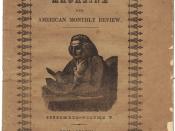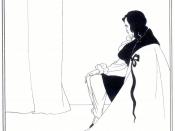Atmosphere and Madness in Poe's The Fall of the House of Usher
Atmosphere and madness are very important aspects in Edgar Allan Poe's short story "The Fall of the House of Usher". They are strongly related to each other, as madness is triggered by the atmosphere suggested by the house in the story. According to I. M. Walker, the tarn, the house and its surroundings lead to Roderick Usher's decay and the whole family's disintegration: ""The fall of the House of Usher" concerns the total disintegration of Roderick Usher, and in accord with Poe's theory of the unity of a work of art, the sinister tarn which so appalls the narrator in the first scene, contributes actively to Usher's destruction" (48).
Therefore, the aim of this essay will be to present each of these two aspects and show the way in which they interact, supporting the arguments with critical evidence.
The first aspect I will discuss is that of atmosphere. The main cause of Roderick Usher's state of mental disturbance and later on, madness, is the gloomy atmosphere caused by the desolate landscapes around the house (Walker 48), and inside the house (Hill 57). The reader learns about this dark, depressing environment through the eyes of the narrator who, while riding towards the house of his friend Usher, has negative emotions at the sight of the "black and lurid tarn that lay in unruffled lustre by the dwelling", in which he sees "inverted images of the grey sedge, and the ghastly tree-stems and the vacant and eye-like windows" (Poe 77). He is so powerfully impressed by the surroundings, that he begins "to believe that about the whole mansion and domain there hung an atmosphere peculiar to themselves and their immediate vicinity - an atmosphere which had no...


